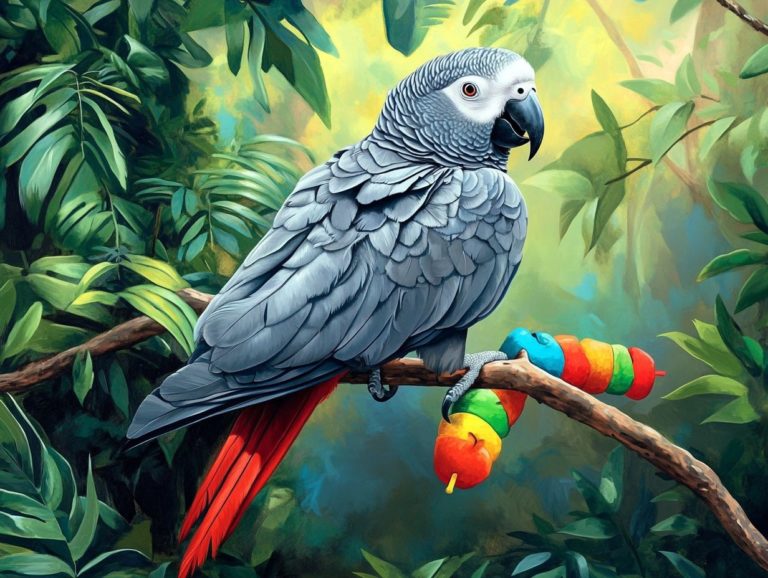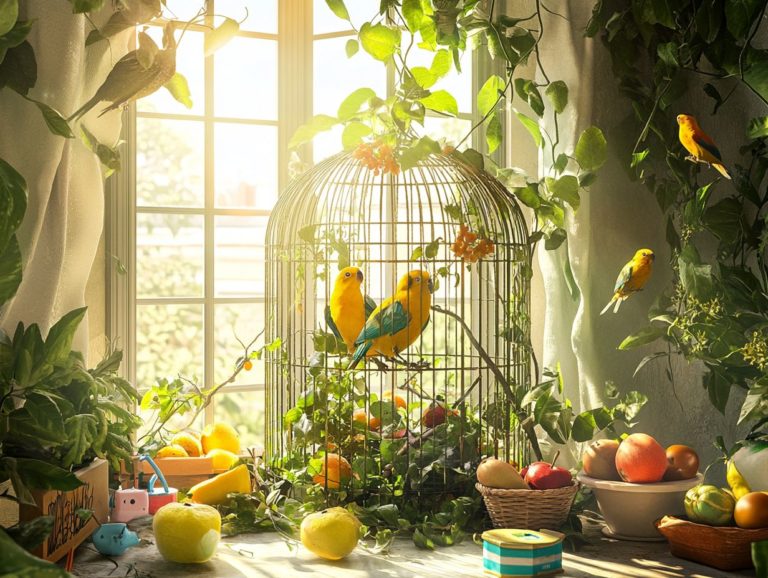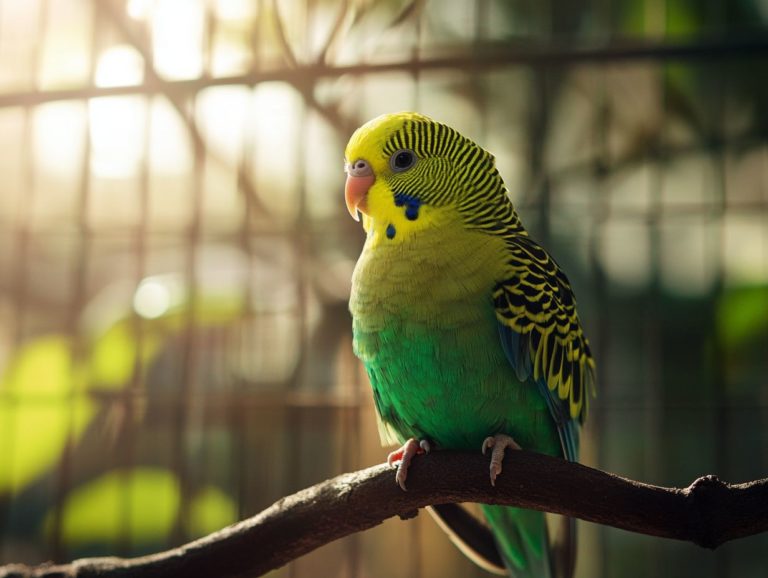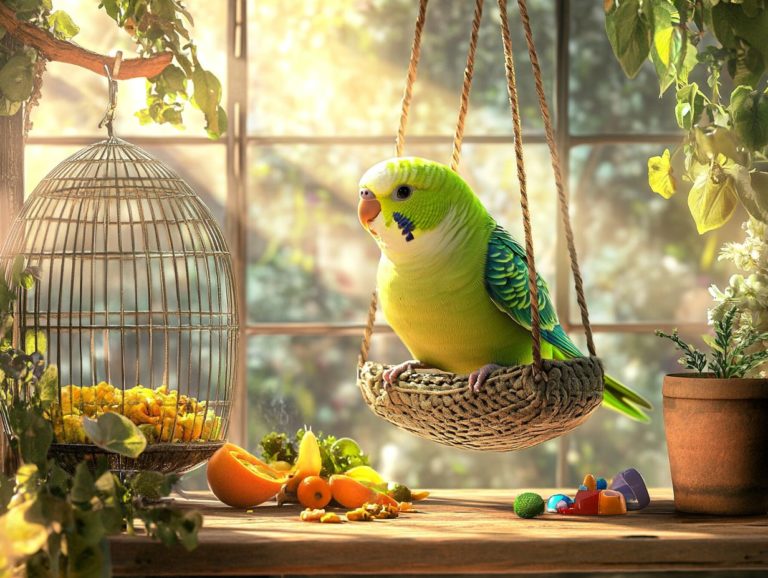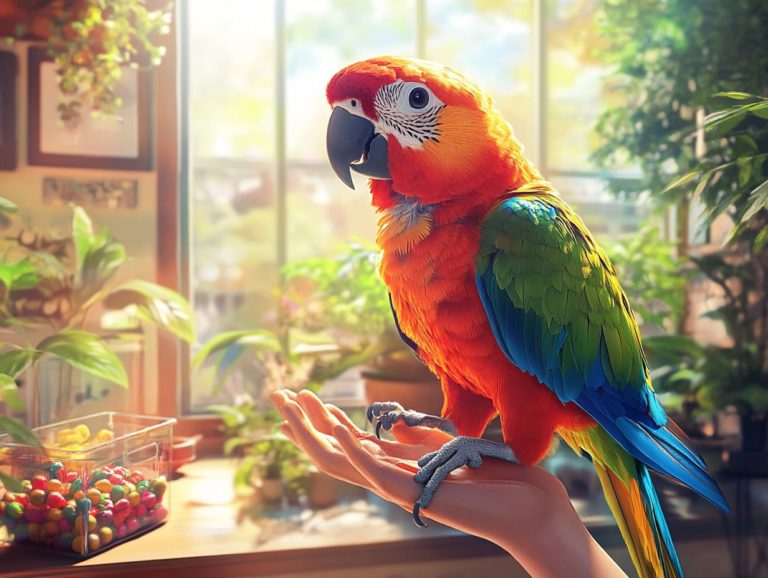Common Myths About Cockatiels Explained
Cockatiels are cherished companions, renowned for their charming personalities and delightful antics. However, several misconceptions can mislead both potential and current owners.
This article seeks to untangle the common myths surrounding these enchanting birds, covering everything from their bird care needs to their bird behavior and nutritional requirements. Prepare to uncover the truths behind these fascinating feathered friends!
Contents
- Key Takeaways:
- Myth: Cockatiels are Low-Maintenance Pets
- Myth: Cockatiels Don’t Need Social Interaction
- Myth: Cockatiels Can Only Eat Seeds
- Myth: Cockatiels Don’t Need Regular Vet Check-Ups from a Dedicated Avian Vet
- Myth: Cockatiels Can’t Learn Tricks
- Frequently Asked Questions
- 1. Are cockatiels messy and loud birds?
- 2. Do cockatiels only bond with one person and become aggressive towards others?
- 3. Is it true that cockatiels can mimic human speech like parrots?
- 4. Are cockatiels boring pets and don’t require much attention?
- 5. Can cockatiels only eat seeds as their main source of nutrition?
- 6. Are cockatiels low-maintenance pets that don’t need regular vet check-ups?
Key Takeaways:
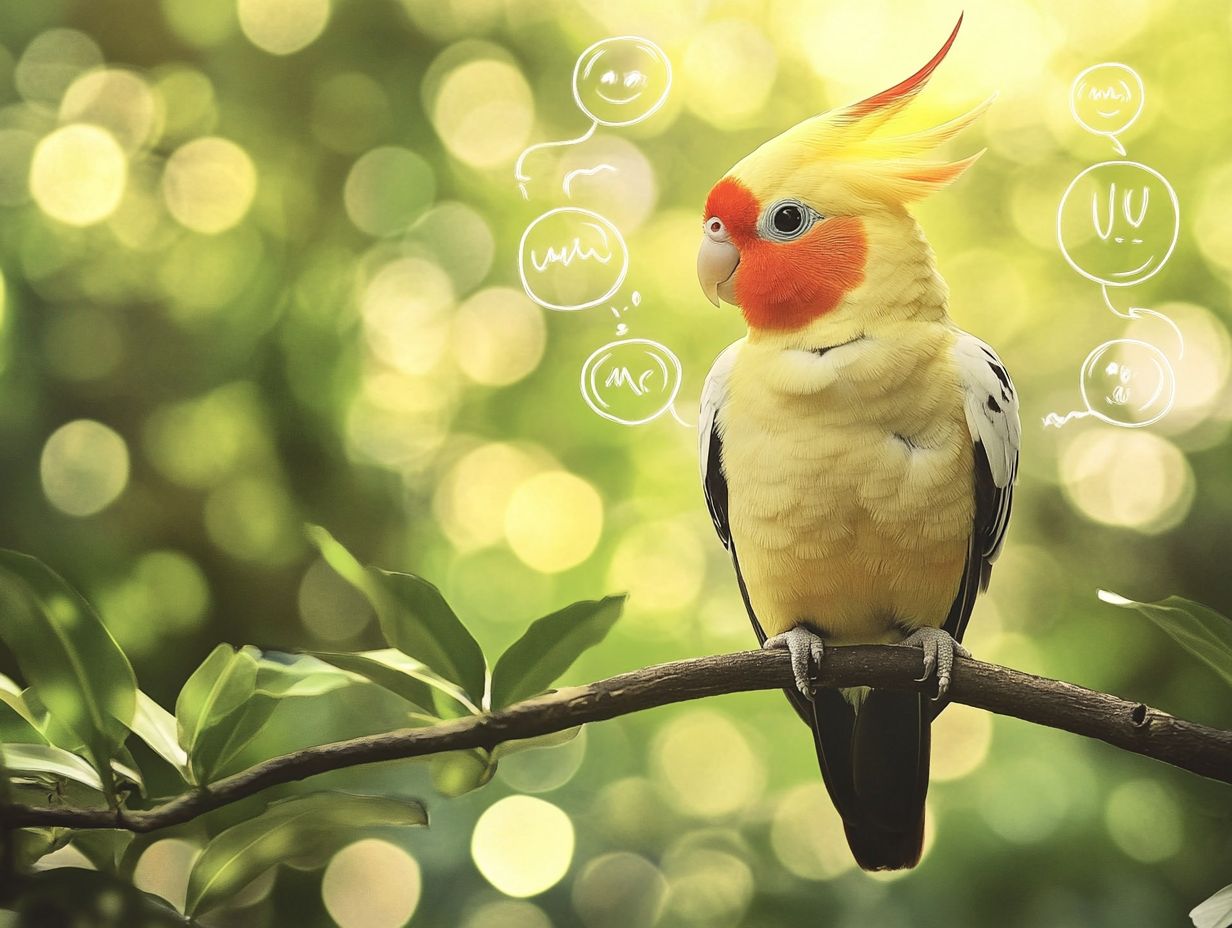
- Cockatiels require regular social interaction for their well-being and happiness, debunking the myth that they are solitary and low-maintenance pets.
- Proper nutrition for cockatiels includes a balanced diet of seeds, fresh fruits, and vegetables, along with occasional treats like Sweet Tarts, to ensure their overall health and longevity.
- Contrary to common belief, cockatiels are intelligent birds that can be trained and taught tricks with patience and positive reinforcement. Regular veterinary check-ups are also necessary for their health and well-being.
Brief Overview of Species
Cockatiels, native to the sun-kissed shores of Australia, are some of the most beloved companions you can find. Their vibrant personalities and unique behaviors make them truly captivating.
These delightful birds, with names like Elvis and Gracie, showcase an impressive array of vocalizations and social interactions that reveal their ability to feel and express emotions.
With lifespans reaching up to 20 years, understanding their needs and common behaviors is vital for ensuring a happy and healthy life for these charming companions. Adorned in striking normal gray plumage and featuring those distinctive orange cheek patches, they are nothing short of visually stunning.
Their social nature allows them to forge deep bonds with you, their human caretakers, while also thriving in multi-bird households, playfully interacting with parakeets and other species. Creating an enriching environment is essential. Ensure they have ample flying space and stimulating toys to keep their minds engaged.
It’s also important to stay vigilant about common health issues, such as feather plucking or respiratory problems. By gaining insights into their nurturing needs and feeding habits, you can contribute to a happier and healthier cockatiel, enhancing their well-being and extending their lifespan.
Myth: Cockatiels are Low-Maintenance Pets
It’s a common misconception that cockatiels are low-maintenance pets. This myth glosses over the specialized care they truly need to flourish as companions.
Embracing proper pet care means recognizing their distinct health concerns, environmental needs, and the common behaviors that call for your attention and dedication. To debunk the myth that cockatiels are low-maintenance pets, you must delve into the specific animal welfare needs and feeding habits that these intelligent birds require.
Their ability to feel and express emotions means they thrive on interaction, making them far more demanding than you might initially think. Proper nutrition transcends mere hand-fed seeds; a well-balanced diet consists of fresh fruits, vegetables, and specially formulated pellets that provide essential vitamins and minerals.
It’s imperative that you invest time in understanding these dietary requirements, as neglecting them could lead to serious health issues down the line. Socialization is equally important. Cockatiels are renowned for their playful and affectionate nature, often mimicking human sounds and behaviors.
If you overlook interaction, you risk creating an environment of boredom and stress, which can manifest in harmful behaviors like excessive plucking. Engaging in regular playtime, providing interactive toys, and even teaching them simple tricks can significantly enhance their emotional well-being.
By recognizing and addressing these needs, you can create a fulfilling environment that ensures your cockatiel remains happy and healthy.
Consider sharing your experiences or learning more about these wonderful birds!
Myth: Cockatiels Don’t Need Social Interaction
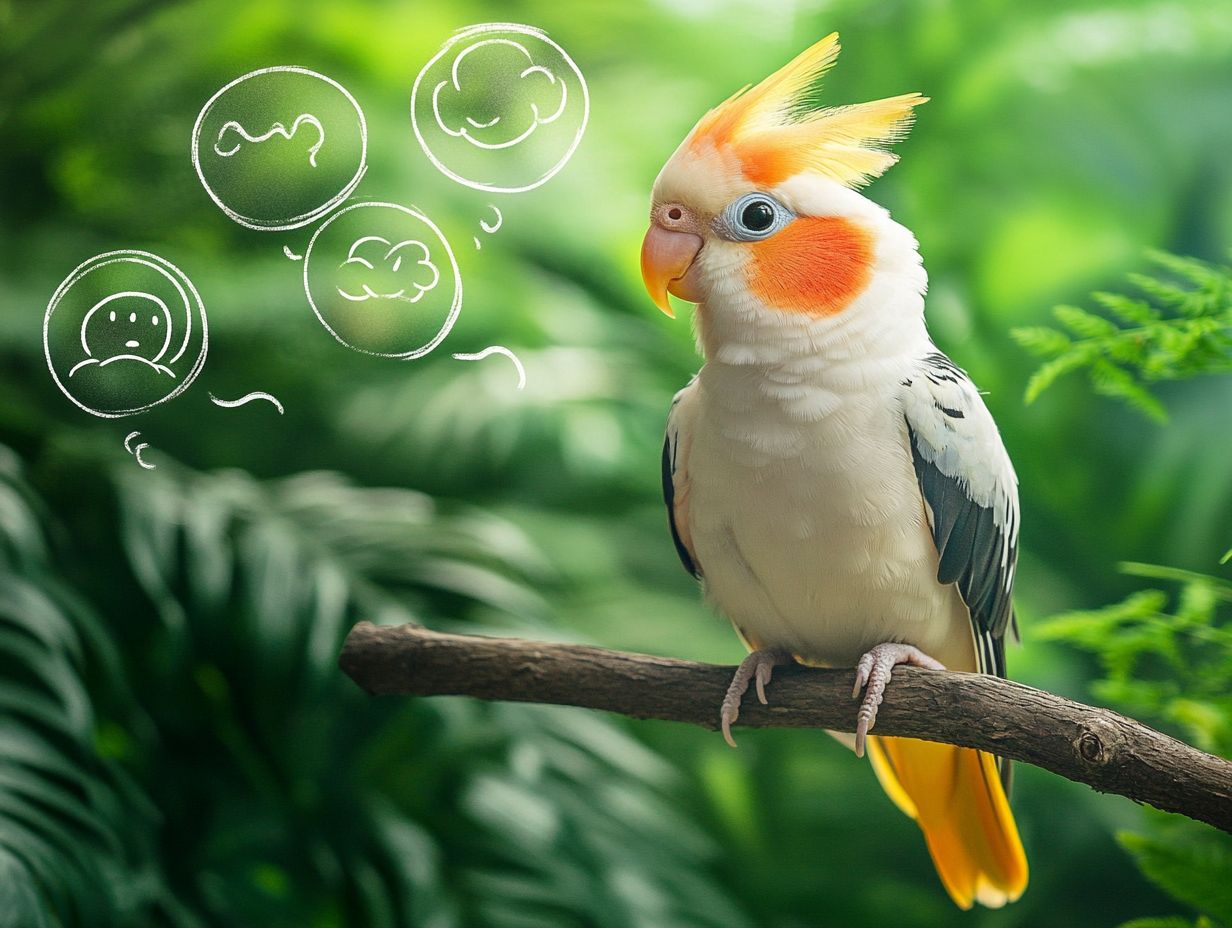
The notion that cockatiels can thrive without social interaction is a misconception. This belief may lead to troubling behavioral issues in these inherently social creatures.
In truth, fostering a strong bond and ensuring regular engagement are essential for the overall well-being of cockatiels as cherished companion animals.
Why Socialization is Important for Cockatiels
Socialization is vital for cockatiels due to their remarkable emotional intelligence and social tendencies. They thrive on interaction with both humans and other birds.
Regular engagement builds strong connections. It also encourages them to express their playful and curious natures.
Whether it’s through shared playtime, training sessions, or even just casual chats, these activities stimulate their minds and deepen the human-animal bond.
The benefits of this consistent interaction are clear: you ll notice their happier demeanor, increased vocalizations, and delightful antics. Conversely, neglecting their social needs can lead to feelings of isolation, resulting in stress, behavioral issues, and even health concerns like feather plucking or lethargy.
By prioritizing social bonding, you can create a vibrant, affectionate environment that nurtures their emotional well-being. Start interacting with your cockatiel today for a happier companion!
Myth: Cockatiels Can Only Eat Seeds
The misconception that cockatiels can thrive exclusively on seeds fosters unhealthy feeding practices. This may result in significant health problems for these birds.
Providing a balanced diet is essential for their overall well-being and longevity as cherished companions.
Proper Nutrition for Cockatiels
Proper nutrition for your cockatiel means offering a balanced diet that caters to their health needs and helps prevent common issues. It’s crucial to move beyond just seeds.
Prioritize high-quality commercial pellets as a staple in their daily diet. This guarantees that essential vitamins and minerals are included.
Fresh fruits like apples, berries, and pears are excellent choices, offering vital nutrients and enticing flavors. Don t forget about leafy greens like kale and spinach, along with colorful vegetables like bell peppers and carrots they should be regular guests at mealtime.
Achieving a balanced diet is crucial. Being mindful of feeding habits, such as portion control and meal variety, can significantly enhance their long-term health and happiness.
Myth: Cockatiels Don’t Need Regular Vet Check-Ups from a Dedicated Avian Vet
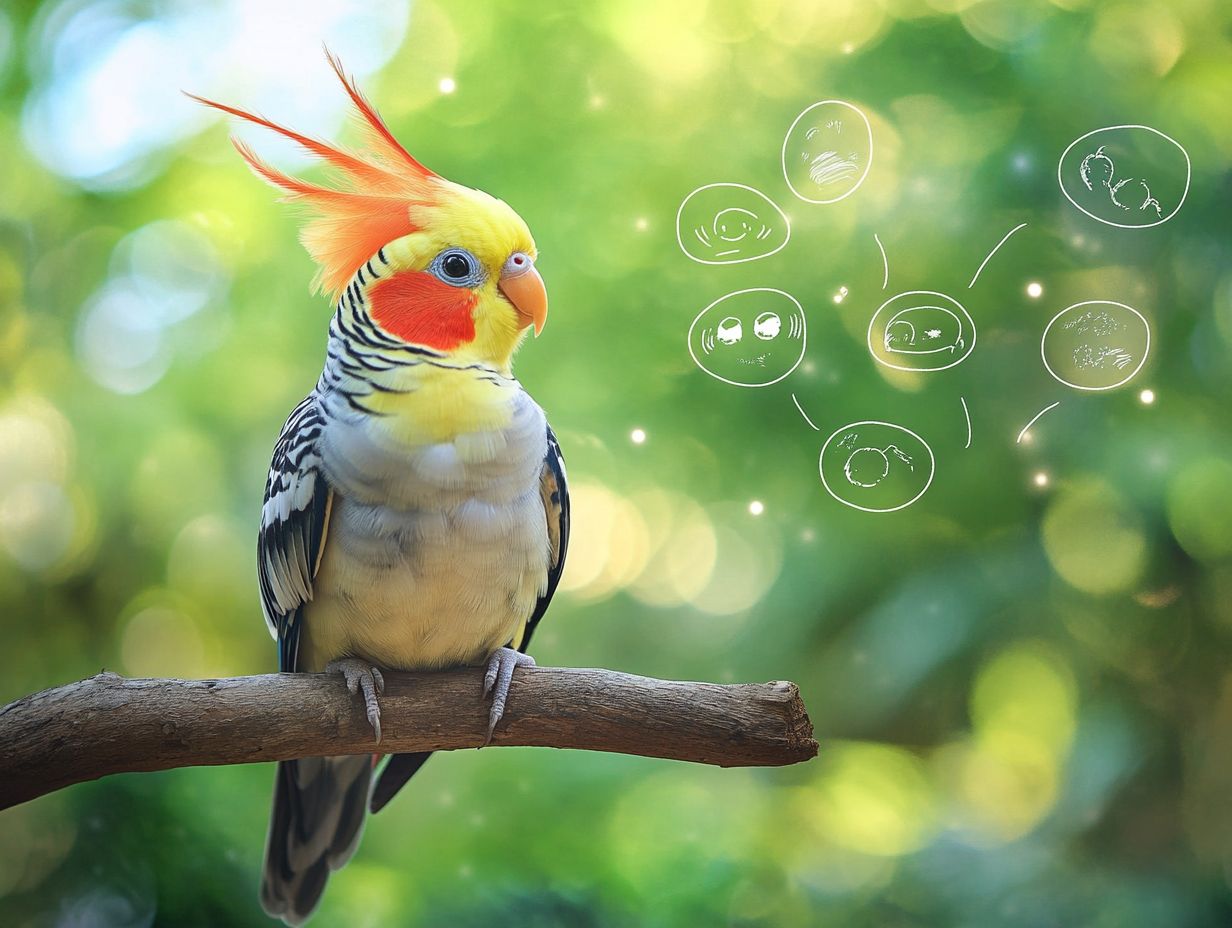
The notion that cockatiels don t need regular veterinary check-ups is a dangerous belief. This can lead to undetected health issues and jeopardized well-being.
Regular veterinary attention from an avian vet a veterinarian specialized in birds is crucial for ensuring the long-term health of these cherished companion birds. Don t wait to take your cockatiel for a check-up regular veterinary visits can save their life!
The Importance of Veterinary Care for Your Cockatiel and Other Pet Birds
Veterinary care for your cockatiel is essential. Regular check-ups help catch health issues early and provide guidance on proper care.
During visits, avian specialists conduct various health checks. These include physical exams, blood work, and diagnostic imaging to assess your bird s well-being.
Cockatiels can be prone to several health concerns such as respiratory infections, feather plucking, or nutritional deficiencies issues that can be effectively addressed with timely care.
Safeguard your feathered friend by addressing hormonal triggers. Here are some effective steps:
- Maintaining a clean living environment
- Providing a balanced diet rich in fruits, vegetables, and seeds
- Ensuring plenty of opportunities for social interaction and mental stimulation
Building a strong relationship with a dedicated avian vet not only supports routine care but also encourages open communication about your cockatiel s dietary and behavioral needs. This ultimately enhances its quality of life.
Myth: Cockatiels Can’t Learn Tricks
The notion that cockatiels are incapable of learning tricks is a common misconception. It undervalues their intelligence and potential for learning. With appropriate training techniques and a healthy dose of patience, you ll find that these delightful birds can display an impressive repertoire of behaviors and vocalizations.
The Intelligence of Cockatiels and Training Tips
Cockatiels are intelligent creatures. They can learn tricks and vocalizations that enhance your bond with them.
By using positive reinforcement techniques, you motivate your cockatiel to learn and build a sense of trust and companionship. Imagine teaching your pet to whistle a simple tune or perform a playful spin it’s both enjoyable and rewarding.
When your cockatiel succeeds, rewarding them with a treat or praise reinforces their learning process.
Engaging in training sessions offers an excellent opportunity for bonding. This structured interaction deepens the connection between you and your bird, making every moment spent together even more fulfilling.
Frequently Asked Questions
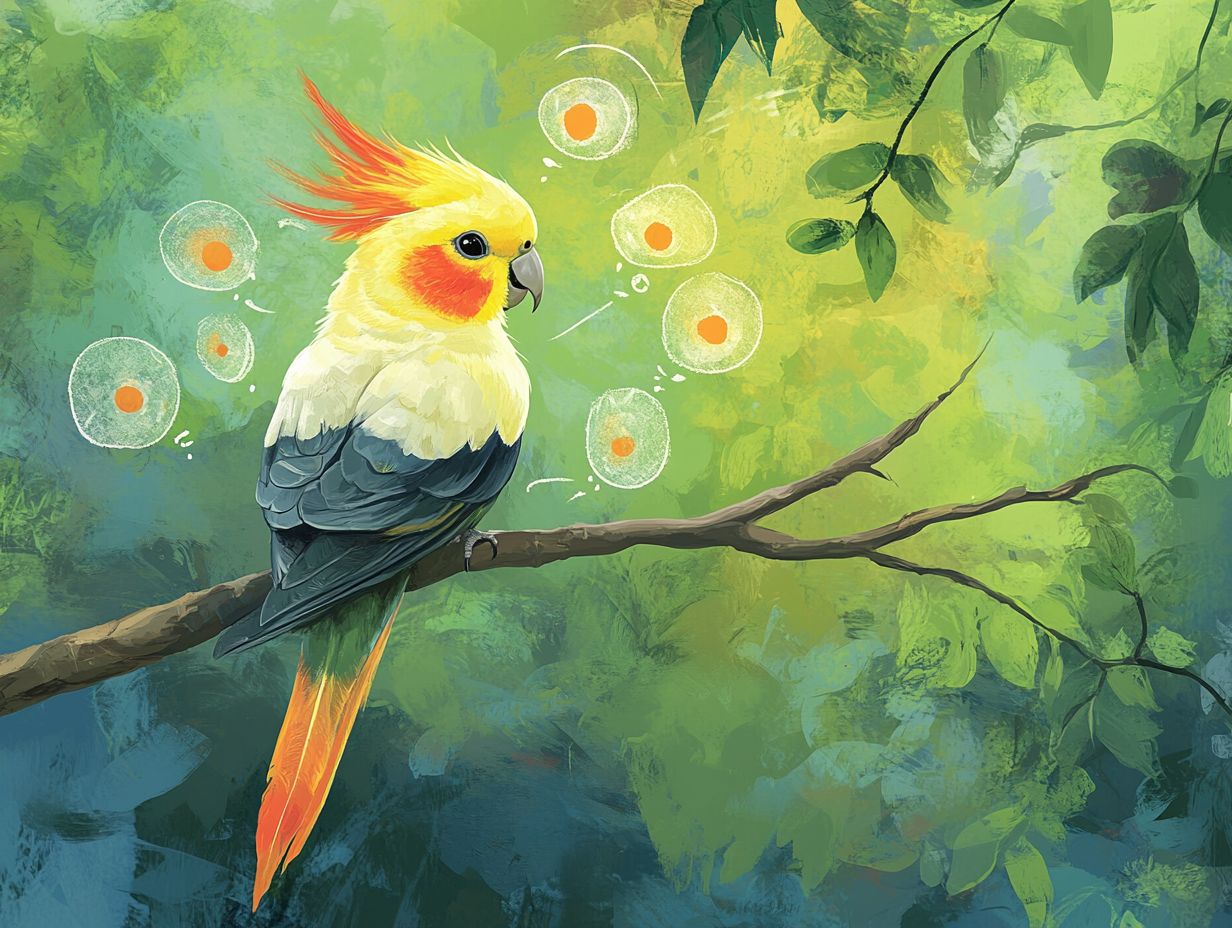
1. Are cockatiels messy and loud birds?
Contrary to popular belief, cockatiels are actually one of the cleanest and quietest bird species. They groom themselves regularly, and their chirping is not as loud as other birds.
2. Do cockatiels only bond with one person and become aggressive towards others?
This is a common myth. Cockatiels can bond with multiple people, including their owners and other family members. They may show aggression if they feel threatened or scared, but it is not a natural behavior for them.
3. Is it true that cockatiels can mimic human speech like parrots?
Cockatiels are not known for their speaking abilities like parrots, but they can learn a few words and sounds with proper training and patience. Their whistling is their natural form of communication.
4. Are cockatiels boring pets and don’t require much attention?
Cockatiels are social creatures. They thrive on interaction and attention from their owners. They need mental and physical stimulation, such as toys and out-of-cage time, to prevent boredom and behavioral issues.
5. Can cockatiels only eat seeds as their main source of nutrition?
While seeds can be part of a cockatiel’s diet, they do not provide all the necessary nutrients. A well-balanced diet should include fresh fruits and vegetables, pellets, and occasional treats.
6. Are cockatiels low-maintenance pets that don’t need regular vet check-ups?
Thinking of getting a cockatiel? Cockatiels, like any other pet, require regular vet check-ups for their health and well-being.
Keep up with their vaccinations and address health problems early to prevent serious issues later.

